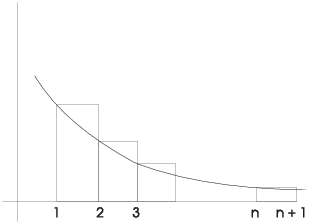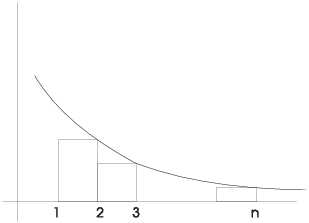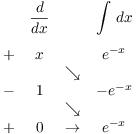The Integral Test tests a series for comvergence or divergence by comparing it to an integral constructing from the series terms.
Theorem. ( Integral
Test) Suppose ![]() is a
series in which the terms are positive. Let
is a
series in which the terms are positive. Let ![]() be the function you get by replacing k by x in
be the function you get by replacing k by x in ![]() . Suppose that:
. Suppose that:
(i) f is continuous for ![]() .
.
(ii) f decreases for ![]() .
.
Then:
(a) If ![]() converges, so does
converges, so does ![]() .
.
(b) If ![]() diverges,
so does
diverges,
so does ![]() .
.
Proof. Divide the interval ![]() up into rectangles of width 1, using the left-hand
endpoints to get the heights. The function f decreases, so the
picture looks like this:
up into rectangles of width 1, using the left-hand
endpoints to get the heights. The function f decreases, so the
picture looks like this:

The sum of the rectangle areas is the ![]() partial sum,
and it is clearly bigger than the area under the curve:
partial sum,
and it is clearly bigger than the area under the curve:
![]()
Therefore, if ![]() diverges, so does
diverges, so does ![]() , but
, but ![]() is the sum of the series.
is the sum of the series.
Next, divide the interval ![]() up into rectangles of width
1, but use the right-hand endpoints to get the heights. The picture
looks like this:
up into rectangles of width
1, but use the right-hand endpoints to get the heights. The picture
looks like this:

The sum of the rectangle areas is clearly smaller than the area under the curve:
![]()
If I add ![]() to both sides, the left side becomes the
n-th partial sum:
to both sides, the left side becomes the
n-th partial sum:
![]()
If ![]() converges, then the partial sums
converges, then the partial sums ![]() form an increasing
sequence that is bounded above by the integral. Hence,
form an increasing
sequence that is bounded above by the integral. Hence, ![]() converges.
converges.![]()
As an application, I'll prove the convergence criteria for p-series.
Proposition. The p-series ![]() converges if
converges if ![]() and diverges if
and diverges if ![]() .
.
Proof. The series ![]() has positive
terms, and
has positive
terms, and ![]() is continuous for
is continuous for
![]() .
.
Suppose ![]() . Then
. Then
![]()
Note that ![]() implies
implies ![]() . Thus, in the
term
. Thus, in the
term ![]() there is a positive power
of b on the bottom. Hence,
there is a positive power
of b on the bottom. Hence, ![]() . That is,
. That is,
![]()
Since the integral converges, the series converges by the Integral
Test. A similar argument shows that if ![]() , then the
series diverges.
, then the
series diverges.![]()
Example. Determine whether the series ![]() converges or diverges.
converges or diverges.
![]() is something you can integrate, so it's natural to
try the Integral Test. (And if the general term of the series is
something that would be difficult to integrate, you should try a
different test!)
is something you can integrate, so it's natural to
try the Integral Test. (And if the general term of the series is
something that would be difficult to integrate, you should try a
different test!)
For ![]() ,
, ![]() . The series has positive terms.
. The series has positive terms.
Let ![]() . f is continuous for
. f is continuous for ![]() . Note that
. Note that
![]()
Hence, f decreases for ![]() . The hypotheses of the Integral
Test are satisfied. (It's important to check the hypothesis before
applying the test!)
. The hypotheses of the Integral
Test are satisfied. (It's important to check the hypothesis before
applying the test!)
Compute the improper integral:
![]()
![]()
Here's the parts table:

Since the integral converges, the series converges by the Integral
Test.![]()
Example. Determine whether the series ![]() converges
or diverges.
converges
or diverges.
The series has positive terms, and ![]() is continuous for
is continuous for ![]() . Compute the
derivative:
. Compute the
derivative:
![]()
Notice that ![]() for
for ![]() . In fact, the first two
terms of the series are
. In fact, the first two
terms of the series are ![]() and
and ![]() , so the terms actually increase at the
start.
, so the terms actually increase at the
start.
However, ![]() for
for ![]() , so the terms
eventually decrease. Thus, the Integral Test applies to
, so the terms
eventually decrease. Thus, the Integral Test applies to ![]() (the
original series with the first term removed). Since the two series
only differ by one term, if one converges, the other converges, and
if one diverges, the other diverges.
(the
original series with the first term removed). Since the two series
only differ by one term, if one converges, the other converges, and
if one diverges, the other diverges.
Therefore, there's actually no harm in applying the Integral Test to the original series, even though, strictly speaking, it doesn't have decreasing terms: Eventually decreasing is good enough.
Comput the integral:
![]()
![]()
![]()
Since the integral diverges, the series diverges, by the Integral
Test.![]()
Warning: The value of the integral in the Integral Test is not equal to the sum of the series.
The proof of the Integral Test yields the formula
![]()
You can use this to estimate the partial sums of a series to which the Integral Test applies.
Example. Estimate the sum of the first 1000 terms of
![]()
This is a divergent p-series with ![]() , so the
Integral Test applies. I have
, so the
Integral Test applies. I have
![]()
You can compute the integrals for yourself; you'd get
![]()
Hence, ![]() .
.![]()
Copyright 2019 by Bruce Ikenaga